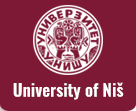Educational-research and educational-artistic activities
In conformity with the Law on Higher Education, and the Statute adopted by the University of Niš, the types and degrees of studies were defined at the University of Niš and the European Credit Transfer (ECTS) was introduced. Higher Education activity is carried out though academic and professional studies.
First degree studies at the University of Niš are organized as basic academic studies and basic professional studies. Second degree studies at the University of Niš are organized as master academic studies, integrated academic and specialist academic studies. University of Niš offers third degree studies – Doctoral academic studies. In line with the higher education reform that was initiated by the Law on Higher Education, the University of Niš and its faculties have conducted intensive
activities on the adoption of new study programs in order to increase the attractiveness of the contents offered to students, and thereby increase the interest of young people to study at the University of Niš.
University of Niš was accredited in February 2009 for the first time, in the third cycle of accreditation of higher education institutions in Serbia, together with the Universities of Belgrade and Novi Sad. Soon after, in August 2010, the first master academic study program of the University of Niš was accredited under the title “Multimedia Technologies in Technical and Technological Sciences in the field of Electrical & Computer Engineering” for the enrollment of 32 students within the premises of the University main building.
In conformity with the Law on Higher Education and by the Decision of the Commission for Accreditation and Quality Assurance of the Republic of Serbia all the faculties of the University of Niš have been accredited.
Research work
Research work is performed at all faculties of the University of Niš, in the areas of basic, applied and development scientific research. Research supports development of science and creativity, improves higher education activities through the improvement of the teaching process, advancement of young scientists, inclusion of students into the academic work, as well as by providing the resources for work and development of the university as a whole. Research work in the previous period has been carried out though participation of the teaching staff in the realization of national and international research projects, publishing papers in academic journals and attending academic seminars in the country and abroad.
Activities financed by the Serbian Ministry of Education, Science and Technological Development represent the basic form of research work at the faculties, and a considerable funding resource. Great number of the faculty teaching staff has been participating in projects of this kind.


